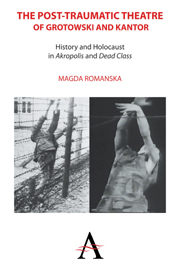 The Post-traumatic Theatre of Grotowski and Kantor
The Post-traumatic Theatre of Grotowski and Kantor from Part I - Our Auschwitz: Grotowski's Akropolis
By 1969, Grotowski “[enjoyed] a god-like status among the experimental troupes of the West.” Following his 1968 Edinburgh success, where he was referred to as “the Edinburgh Festival's biggest theatrical catch,” his position in Western European and American avant-garde circles was well-established. Even before arriving on American soil, Grotowski's troupe was “preceded by its reputation for being one of the most important experimental companies in the world,” and “perhaps the most celebrated acting troupe in the world.” Grotowski was called “an unquestioned genius of modern dramatic innovation” “one of the greatest artists in the theatre that has ever lived” and “the third great original theater mind of the century [after Stanislavsky and Artaud].” Writing for the New York Times, Clive Barnes rhetorically asked and answered: “Is Grotowski one of the great theatrical innovators of our time? Yes.” The accolades, some sincere, some ridiculously pretentious, seemed to come from every direction, prompting Ronald Bryden to sardonically note, “Grotowski: such is the theatre's newest name of God. He is the magis’ mage, guru of the gurus: the ultimate to which Living Theatre, Peter Brook and the Tulane Drama Review bow down.”
However, while Grotowski was acclaimed abroad, particularly in America, his position in Poland was ambiguous to say the least. Both Polish theatre professionals and audiences treated him with suspicion, mostly ignoring his work and his group.
To save this book to your Kindle, first ensure [email protected] is added to your Approved Personal Document E-mail List under your Personal Document Settings on the Manage Your Content and Devices page of your Amazon account. Then enter the ‘name’ part of your Kindle email address below. Find out more about saving to your Kindle.
Note you can select to save to either the @free.kindle.com or @kindle.com variations. ‘@free.kindle.com’ emails are free but can only be saved to your device when it is connected to wi-fi. ‘@kindle.com’ emails can be delivered even when you are not connected to wi-fi, but note that service fees apply.
Find out more about the Kindle Personal Document Service.
To save content items to your account, please confirm that you agree to abide by our usage policies. If this is the first time you use this feature, you will be asked to authorise Cambridge Core to connect with your account. Find out more about saving content to Dropbox.
To save content items to your account, please confirm that you agree to abide by our usage policies. If this is the first time you use this feature, you will be asked to authorise Cambridge Core to connect with your account. Find out more about saving content to Google Drive.